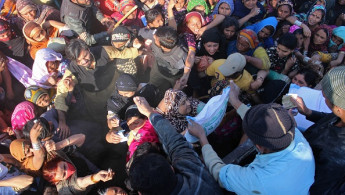Over $9 billion raised for Pakistan flood recovery, Islamabad asks IMF for restructuring 'pause'
Pakistan received over $9 billion in pledges Monday to help it recover from last year's catastrophic floods, vowing to become a model for how countries can build climate change resilience.
Pakistan is still reeling from the unprecedented deluge that submerged huge swathes and killed more than 1,700 people, while over 33 million others suffered its impacts.
"We are perhaps the first country ever that has seen a third of its landmass underwater," Pakistan Foreign Minister Bilawal Bhutto Zardari told AFP at the end of an international conference in Geneva seeking support for his country's resilient flood recovery.
"Unfortunately, we won't be the last."
He voiced hope that the "resounding success" of the conference, which garnered more pledges than hoped for, could "provide a template going forward for future countries who find themselves in distress."
Pakistan, with the world's fifth-largest population, generates less than one percent of global greenhouse gas emissions but is one of the nations most vulnerable to extreme weather caused by global warming.
UN chief Antonio Guterres called for "massive investments" to help Pakistan recover from a "monsoon on steroids".
"Countries on the frontlines of the climate crisis need massive support," he said, while Pakistan Prime Minister Shehbaz Sharif warned his country was "racing against time" to deal with towering needs.
"We need to give 33 million people their future back."
After the floods, a wave of disease plagues Pakistan as 9 million people are dragged into poverty
— The New Arab (@The_NewArab) October 22, 2022
✍Shehrazade Shams https://t.co/qtn7Coa855
The Resilient Recovery, Rehabilitation and Reconstruction Framework, which Pakistan presented at the United Nations-sponsored conference, calls for $16.3 billion over the next three years for the initial efforts to rebuild and improve its ability to withstand future climate shocks.
Pakistan said it should be able to cover half the cost but pleaded with the international community to fund the rest.
In the end, it received more than $9 billion in pledges, including a promise of 360 million euros ($384 million) from France and $100 million in additional funding from Washington and Beijing.
And the World Bank and a range of regional development banks promised billions in loans.
"We have surpassed our own target for this conference," Bhutto Zardari said, stressing though that more was needed.
Describing the floods as "something out of a horror movie," he said Pakistan nonetheless had discovered "opportunity in this crisis"
"Now we can invest in infrastructure in ... the most underprivileged areas, the most deprived areas, (which) will allow us to grow our local economy."
But the country still faces monumental challenges.
The UN chief warned Monday that in addition to being lashed by climate change, "Pakistan is also a victim of the man-made disaster of a morally bankrupt global financial system. A system that denies middle-income countries debt relief and concessional financing to invest in resilience and recovery.
"That must change."
Sharif meanwhile told reporters he had asked the IMF for a pause in its demands for economic reforms in exchange for more aid.
The global lender wants Pakistan to withdraw remaining subsidies for petroleum products and electricity, aimed at helping households, before releasing the remainder of a $6 billion deal negotiated by the previous government.
While insisting Pakistan was committed to the IMF programme, Sharif asked "how on Earth" the country's poorest could shoulder additional burdens, describing the situation as "nightmarish".
And the IMF is not the only one making demands.
The World Bank promised Pakistan a $2-billion loan, but also insisted the country needed to undertake "additional fiscal and structural reforms."
Guterres also said Pakistan proved the need for a "loss and damage" fund, agreed at the UN's COP27 climate summit in November, that could cover the climate-related destruction endured by developing nations.
"If there is any doubt about loss and damage, go to Pakistan," he said.
The situation there also clearly showed the dangers of inaction to stop global warming.
"Today it's Pakistan. Tomorrow it could be your country," Guterres said.
"Without action, climate catastrophe is coming for all of us."





 Follow the Middle East's top stories in English at The New Arab on Google News
Follow the Middle East's top stories in English at The New Arab on Google News
![The UAE is widely suspected of arming the RSF militia [Getty]](/sites/default/files/styles/image_330x185/public/2024-11/GettyImages-472529908.jpg?h=69f2b9d0&itok=Yauw3YTG)
![Netanyahu furiously denounced the ICC [Getty]](/sites/default/files/styles/image_330x185/public/2024-11/GettyImages-2169352575.jpg?h=199d8c1f&itok=-vRiruf5)
![Both Hamas and the Palestinian Authority welcomed the ICC arrest warrants [Getty]](/sites/default/files/styles/image_330x185/public/2024-11/GettyImages-2178351173.jpg?h=199d8c1f&itok=TV858iVg)